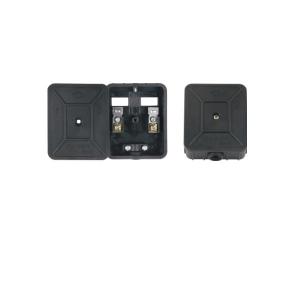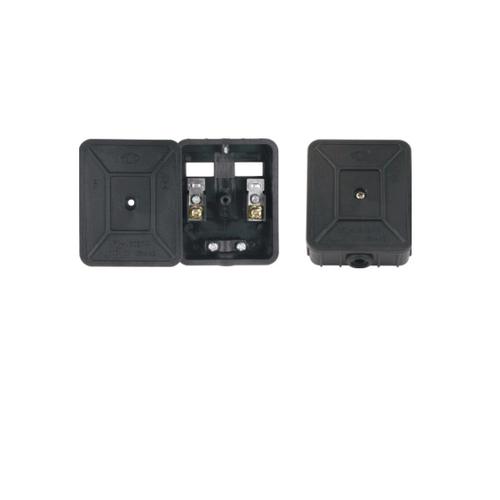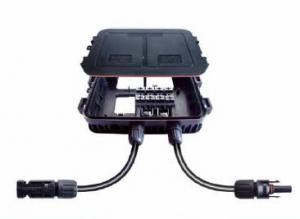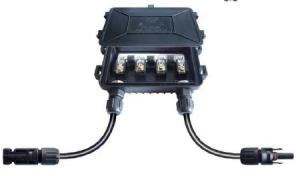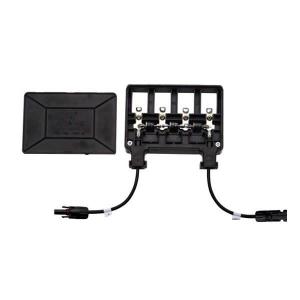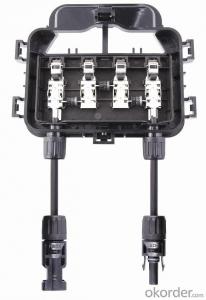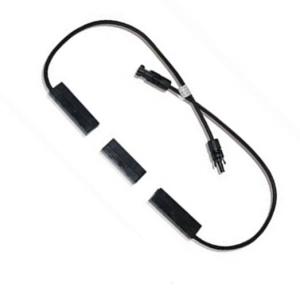Solar Junction box PV-JB030A
- Loading Port:
- China Main Port
- Payment Terms:
- TT OR LC
- Min Order Qty:
- -
- Supply Capability:
- 10000 set/month
OKorder Service Pledge
Quality Product, Order Online Tracking, Timely Delivery
OKorder Financial Service
Credit Rating, Credit Services, Credit Purchasing
You Might Also Like
Solar Junction box,Due to highly robustness,UV-resistance,the touch protection a high grade connection is guaranteed for many .
Solar Junction box,Due to highly robustness,UV-resistance,the touch protection a high grade connection is guaranteed for many years
| Rated voltage | 1000 V |
| Rated current | 6A |
| Contact resistance | ≤5mΩ |
| Protection degree(mated,junction box closed/unmated) | IP65/IP2X |
| Operating temperature | -40 C to +85C |
| Insulation material | PPO |
| Contact material | Copper,silver plated |
- Q: Can solar energy systems be used in areas with strict building codes or historical preservation restrictions?
- Yes, solar energy systems can be used in areas with strict building codes or historical preservation restrictions. In such cases, the installation of solar panels may require careful planning and compliance with specific guidelines to ensure architectural aesthetics and historical significance are preserved. This can be achieved through the use of alternative mounting options, such as ground-mounted or solar carport systems, that do not impact the building's exterior. Additionally, advancements in solar technology have allowed for the development of sleek and discreet panels that blend seamlessly with the surrounding architecture, making them more acceptable in historically preserved areas.
- Q: What is the difference between solar thermal and solar photovoltaic systems?
- Solar thermal systems use the heat from the sun to generate hot water or steam, which can be used for heating or to produce electricity through a steam turbine. On the other hand, solar photovoltaic systems directly convert sunlight into electricity using semiconducting materials, such as silicon, without the need for heat conversion.
- Q: Can solar energy systems be used in disaster-prone areas?
- Certainly, solar energy systems have the potential to be utilized in areas prone to disasters. In reality, they can prove particularly advantageous in such regions. Conventional power grids often prove to be fragile and susceptible to damage during natural calamities such as hurricanes, earthquakes, or floods. Consequently, these events can result in prolonged periods without electricity, hindering relief and recovery efforts. On the other hand, solar energy systems are decentralized and can operate independently from the grid. These systems consist of solar panels that convert sunlight into electricity, which can then be stored in batteries for use during power outages. This enables critical facilities, including hospitals, emergency response centers, and shelters, to function even when the grid is not operational. Solar energy systems can provide a reliable source of power for lighting, communication, refrigeration, and medical equipment, significantly enhancing the resilience and efficacy of disaster response. Moreover, solar energy systems can also be employed to power water pumps, ensuring that communities have access to clean water during crises. This is particularly crucial in disaster-prone areas where access to safe drinking water can be severely compromised. Solar-powered pumps can extract water from wells, rivers, or other sources, ensuring a consistent supply for drinking, sanitation, and hygiene purposes. Additionally, solar energy systems can contribute to long-term recovery efforts in disaster-prone areas. By reducing reliance on fossil fuels and conventional power grids, they can aid in the creation of sustainable and resilient communities. Solar panels can be installed on rooftops or in open spaces, utilizing the abundance of sunlight resources. This not only reduces greenhouse gas emissions and mitigates climate change but also provides a dependable and cost-effective source of energy for homes, businesses, and public infrastructure. In conclusion, solar energy systems can effectively serve disaster-prone areas by providing dependable power, supporting critical services, and promoting long-term resilience. By harnessing the power of the sun, these systems offer a sustainable and decentralized solution to energy needs, ensuring that communities can withstand and recover from natural disasters more effectively.
- Q: Can solar energy systems be used in powering printing presses or publishing houses?
- Yes, solar energy systems can be used to power printing presses or publishing houses. Solar panels can generate electricity from sunlight, which can be used to power the various equipment and machinery required in printing or publishing processes. Additionally, solar energy systems can help reduce electricity costs and environmental impact, making them a sustainable and viable option for powering these operations.
- Q: Are there any government incentives or tax credits for installing a solar energy system?
- Yes, there are government incentives and tax credits available for installing a solar energy system. These incentives and credits vary by country and region, but they often include federal tax credits, state or local rebates, grants, and incentives that aim to promote the adoption of renewable energy sources. It is advisable to research and consult with local authorities or a tax professional to determine the specific incentives and credits available in your area.
- Q: Can solar energy systems be used for powering off-grid eco-retirement communities?
- Yes, solar energy systems can indeed be used for powering off-grid eco-retirement communities. Solar power provides a sustainable and renewable energy source that can efficiently meet the energy needs of such communities. With proper planning and installation of solar panels, off-grid eco-retirement communities can reduce their dependence on fossil fuels and minimize their environmental impact while enjoying reliable and independent power supply.
- Q: How does net metering work?
- Net metering is a billing arrangement that allows customers with solar panels or other renewable energy systems to receive credit for any excess electricity they generate and feed back into the grid. The electricity meter measures the difference between the energy consumed from the grid and the energy generated by the customer's system. This net difference determines the amount of energy credited or charged to the customer's account. In essence, net metering enables homeowners to offset their electricity costs and promotes the adoption of clean energy sources.
- Q: Can solar energy systems be used for powering electric drone systems?
- Yes, solar energy systems can be used to power electric drone systems. Solar panels can be mounted on the drone or on the ground to capture sunlight and convert it into electricity. This electricity can then be used to power the drone's motors and other electrical components. Solar-powered drones offer several advantages such as longer flight times, reduced operating costs, and increased sustainability. They can also operate in remote areas where access to traditional power sources may be limited. However, it is important to note that the efficiency of solar panels and the amount of power they generate depend on factors such as the size of the panels, the amount of sunlight available, and the energy requirements of the drone.
- Q: Can a solar energy system be installed in an apartment or rental property?
- Installing a solar energy system in an apartment or rental property is indeed feasible, but there are several factors to bear in mind. To begin with, it is crucial to ascertain whether your landlord or property owner is amenable to the idea of a solar energy system. Some landlords may be supportive of green initiatives and might even contribute to the installation costs. Conversely, others may have stipulations in place, necessitating a discussion with them prior to moving forward. Secondly, the viability of installing a solar energy system in an apartment or rental property hinges on the availability of appropriate space for solar panels. Typically, this would be the rooftop of the building. If the rooftop is shared among multiple tenants, it is necessary to engage in dialogue with them and obtain their consent as well. Furthermore, the legal and financial aspects should not be overlooked. Engaging the services of a solar energy contractor to assess technical feasibility and installation costs may be necessary. Additionally, it is crucial to research the laws and regulations pertaining to solar installations on rental properties in your area, as there may be specific prerequisites or permissions required. Lastly, if you are a tenant, the duration of your lease must be taken into account. Installing a solar energy system is a long-term investment, and it may not be financially viable if you plan to vacate the premises before the system has recouped its costs through energy savings. In conclusion, while it is possible to install a solar energy system in an apartment or rental property, open communication with your landlord, consideration of available space, evaluation of legal and financial aspects, and contemplation of your lease duration are all vital before proceeding.
- Q: Can solar energy systems be used for powering streetlights or outdoor lighting?
- Yes, solar energy systems can be used to power streetlights and outdoor lighting. Solar-powered streetlights and outdoor lighting systems are becoming increasingly common and offer a sustainable and cost-effective alternative to traditional electricity-powered lighting. These systems harness energy from the sun during the day and store it in batteries, which then power the lights during the night. Solar energy systems for streetlights and outdoor lighting help reduce carbon emissions and dependence on the grid while providing reliable illumination.
Send your message to us
Solar Junction box PV-JB030A
- Loading Port:
- China Main Port
- Payment Terms:
- TT OR LC
- Min Order Qty:
- -
- Supply Capability:
- 10000 set/month
OKorder Service Pledge
Quality Product, Order Online Tracking, Timely Delivery
OKorder Financial Service
Credit Rating, Credit Services, Credit Purchasing
Similar products
Hot products
Hot Searches
Related keywords
